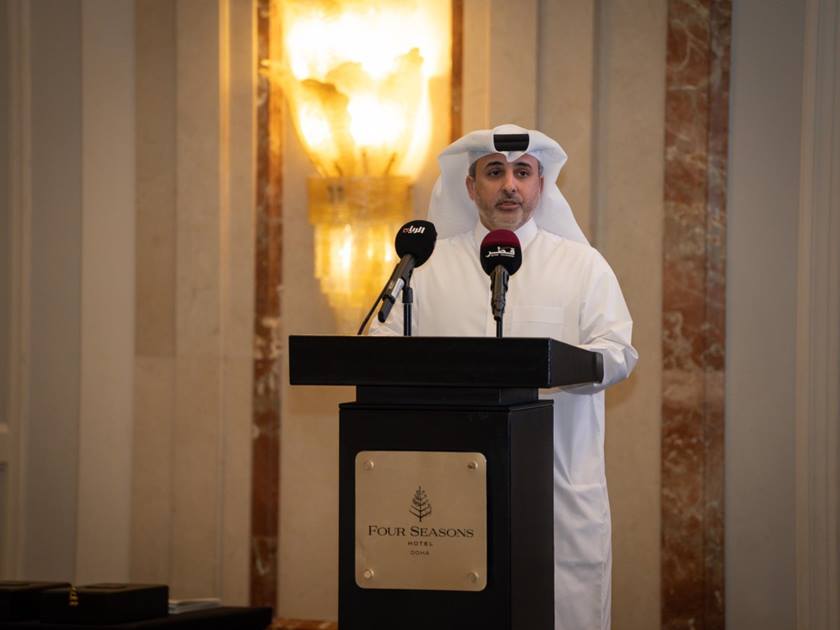ID :
675174
Tue, 01/16/2024 - 21:45
Auther :
Shortlink :
http://m.oananews.org//node/675174
The shortlink copeid
Minister of Environment and Climate Change Confirms IAEA Accreditation of Qatari Labs as International Training Centers

Doha, January 16 (QNA) - HE Minister of Environment and Climate Change Dr. Abdullah bin Abdulaziz bin Turki Al Subaie confirmed that the International Atomic Energy Agency (IAEA) has accredited laboratories in the State of Qatar as approved international training centers in the fields of radiation medicine and food safety, through a Memorandum of Practical Arrangements. During his speech at the national symposium on the 'peaceful uses of atomic energy' organized by the ministry on Tuesday, HE Minister of Environment and Climate Change referred to the initiation of procedures to designate the Hamad Medical Cooperation as a "reference center" to support the IAEA's "Rays of Hope" initiative, which aims to provide treatment for cancer patients for all, especially developing countries. His Excellency also noted the ministry's participation in the regional project Contributing to the Global Monitoring of Marine Plastic Pollution under the IAEA Nuclear Technology for Controlling Plastic Pollution (NUTEC Plastics) Initiative, stressing the country's benefit from technical cooperation with the Agency, through a regional project to support national and regional capabilities as part of the framework of the Zoonotic Disease Integrated Action (ZODIAC). In light of its National Vision 2030, the State of Qatar is participating in 25 technical cooperation projects, in collaboration with the IAEA, based on the country's framework program document with the agency, which addresses major development issues and programmatic priorities in the fields of medicine and human health, food and agriculture, environmental protection, water resources management, human resources development, radiation safety and nuclear security, HE Minister of Environment noted. His Excellency added that Qatar, through technical cooperation projects, established a secondary calibration laboratory to calibrate all types of radiometric measuring devices, which is the largest of its kind in the region. This is because it includes all different types of calibrations in order to protect humans and the environment from the dangers of ionizing radiation. The technical cooperation projects in the field of radiation safety included the agency's approval to support a national project for the State of Qatar with the aim of strengthening supervisory control and implementing an effective program for the safe handling of Natural-Occurring Radioactive Materials (NORM) waste, a project that will begin implementation in January and will continue until the end of 2026, His Excellency pointed out. His Excellency also touched on the efforts of the Ministry of Environment and Climate Change in a number of related fields, which included the ministry issuing draft guidelines for radiation protection in several fields, in line with modern international safety standards, with the aim of approving and implementing them by the user agencies, noting that the Ministry holds periodic tests for more than 300 workers in the radiation fields in the country to ensure that they meet the conditions and scientific and technical information in accordance with the agency's international standards. His Excellency remarked that the design of the study models, scientific materials and tests was conducted in cooperation with the IAEA's experts. At the regional and international level, HE Minister of Environment and Climate Change confirmed that Qatar is participating in 10 economic and social projects, within the ARASIA projects, which aim to build capabilities and training to meet the common priority needs of the Arab countries in Asia. His Excellency also emphasized that Qatar is implementing all the provisions of the agreements concluded with the IAEA, noting in this context Qatar's constant support for the Agency, and called on it to continue its role in promoting the benefits of the peaceful use of atomic energy. For her part, Linda Eid, IAEA Programme Management Officer for the technical cooperation programs of the State of Qatar, stressed the continuation of collaboration between the IAEA and the State of Qatar to support national priorities and peaceful applications of nuclear technology for sustainable development, noting that the Technical Cooperation Program is the Agency's main channel to provide tangible support to member states and help them advance the application of nuclear technologies in many fields in a safe manner. Eid explained, during her speech, that the Agency's Technical Cooperation Department works with more than 149 countries, including 35 least-developed countries, to support nuclear applications in many areas of development, pointing out that the technical cooperation program between Qatar and the Agency, which began in 2005, it included 37 projects at the national level, and the new program includes three projects directed to support national efforts in: medical imaging (PET-MRI), livestock, and management of radioactive waste resulting from the oil and gas sector. The National Symposium on the Peaceful Uses of Atomic Energy reviewed the success stories of the Technical Cooperation Program projects between the State of Qatar and the International Atomic Energy Agency in a number of areas of national development, as well as the support provided by the Agency in implementing projects, in the presence of a number of local experts and IAEA officials. The symposium recommended widening the peaceful uses of radiological techniques for the purpose of development and serving humanity, expanding knowledge of the peaceful uses of radiation among the public and students, and spreading the teaching of nuclear science and its uses in schools and universities so that there will be graduated personnel working in the field. The symposium encouraged the continuation of collaboration with national project coordinators for national authorities and the IAEA to implement and benefit from projects at the national level, as well as the commitment of project coordinators and concerned parties to execute the project plan according to the specified time in order to take advantage of the projects. (QNA)





